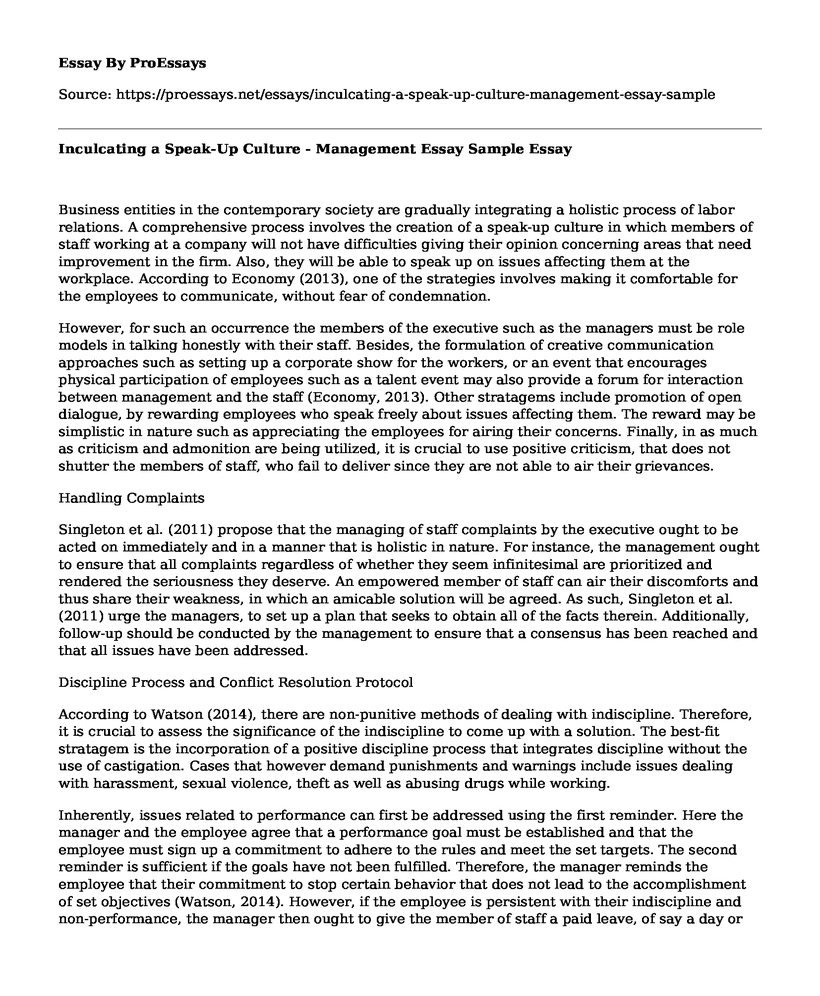Business entities in the contemporary society are gradually integrating a holistic process of labor relations. A comprehensive process involves the creation of a speak-up culture in which members of staff working at a company will not have difficulties giving their opinion concerning areas that need improvement in the firm. Also, they will be able to speak up on issues affecting them at the workplace. According to Economy (2013), one of the strategies involves making it comfortable for the employees to communicate, without fear of condemnation.
However, for such an occurrence the members of the executive such as the managers must be role models in talking honestly with their staff. Besides, the formulation of creative communication approaches such as setting up a corporate show for the workers, or an event that encourages physical participation of employees such as a talent event may also provide a forum for interaction between management and the staff (Economy, 2013). Other stratagems include promotion of open dialogue, by rewarding employees who speak freely about issues affecting them. The reward may be simplistic in nature such as appreciating the employees for airing their concerns. Finally, in as much as criticism and admonition are being utilized, it is crucial to use positive criticism, that does not shutter the members of staff, who fail to deliver since they are not able to air their grievances.
Handling Complaints
Singleton et al. (2011) propose that the managing of staff complaints by the executive ought to be acted on immediately and in a manner that is holistic in nature. For instance, the management ought to ensure that all complaints regardless of whether they seem infinitesimal are prioritized and rendered the seriousness they deserve. An empowered member of staff can air their discomforts and thus share their weakness, in which an amicable solution will be agreed. As such, Singleton et al. (2011) urge the managers, to set up a plan that seeks to obtain all of the facts therein. Additionally, follow-up should be conducted by the management to ensure that a consensus has been reached and that all issues have been addressed.
Discipline Process and Conflict Resolution Protocol
According to Watson (2014), there are non-punitive methods of dealing with indiscipline. Therefore, it is crucial to assess the significance of the indiscipline to come up with a solution. The best-fit stratagem is the incorporation of a positive discipline process that integrates discipline without the use of castigation. Cases that however demand punishments and warnings include issues dealing with harassment, sexual violence, theft as well as abusing drugs while working.
Inherently, issues related to performance can first be addressed using the first reminder. Here the manager and the employee agree that a performance goal must be established and that the employee must sign up a commitment to adhere to the rules and meet the set targets. The second reminder is sufficient if the goals have not been fulfilled. Therefore, the manager reminds the employee that their commitment to stop certain behavior that does not lead to the accomplishment of set objectives (Watson, 2014). However, if the employee is persistent with their indiscipline and non-performance, the manager then ought to give the member of staff a paid leave, of say a day or two, for them to think about their life, as well as evaluate their priorities. The worker will then need to give the employer feedback on their resolution on whether they will remain and change, or whether they desire to seek greener pastures elsewhere.
References:
Economy, P. (2013, October 03). 5 Ways to Get Your Employees to Speak Up. Retrieved May 09, 2017, from https://www.inc.com/peter-economy/5-ways-to-get-your-employees-to-speak-up.html
Singleton, R., Toombs, L. A., Taneja, S., Larkin, C., & Pryor, M. G. (2011). Workplace conflict: A strategic leadership imperative. International Journal of Business & Public Administration, 8(1), 149-163.
Watson, T. (2014, April 15). DISCIPLINE WITHOUT PUNISHMENT: A BEST PRACTICES APPROACH TO DISCIPLINING EMPLOYEES. Retrieved May 09, 2017, from https://www.watson-training.com/blog2/46-discipline-with-punishment-a-best-practices-approach-to-disciplining-employees.html
Cite this page
Inculcating a Speak-Up Culture - Management Essay Sample. (2021, Jun 16). Retrieved from https://proessays.net/essays/inculcating-a-speak-up-culture-management-essay-sample
If you are the original author of this essay and no longer wish to have it published on the ProEssays website, please click below to request its removal:
- Application Example: Job Application as a Project Manager
- PM Leadership Essay
- Case Study of a Company's Output Strategy
- Infrastructure Risk Management Paper Example
- Essay Sample on Employee Integrity Test: Ensuring Honesty and Dependability for Job Success
- Research Paper on DNP Leader's Political Competence: Enhancing Performance in the Workplace
- Paper Example on Leadership: Strategies for Successful People Management







